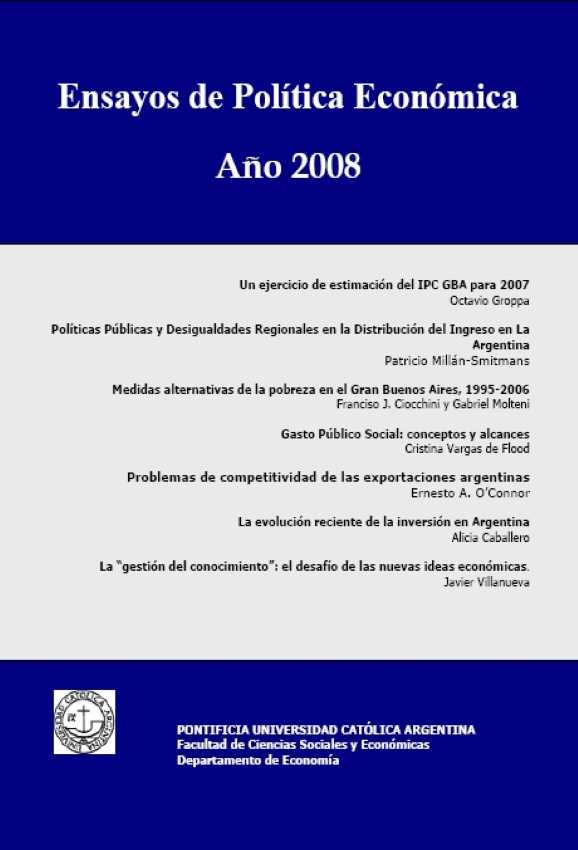Políticas Públicas y Desigualdades Regionales en la Distribución del Ingreso en la Argentina
Palabras clave:
Distribución, desigualdadResumen
El análisis de los indicadores de ingresos, desigualdad y pobreza en cada uno de los 32 centros urbanos muestra las grandes disparidades regionales de la Argentina. En la Zona Norte del país el ingreso per capita es un 35% inferior al promedio nacional, la pobreza es 4 veces mayor que en la capital y la distribución del ingreso es más desigual. Los datos estadísticos disponibles indican que el crecimiento económico y las políticas públicas que se han implementado recientemente han reducido los niveles de pobreza agregados, pero han tenido poco impacto en las regiones más pobres del país. Por otra parte, el impacto distributivo de las políticas y programas públicos en la Argentina es reducido cuando se los compara con lo que sucede en los países mas desarrollados. Se requiere el diseño y la implementación de nuevas políticas públicas de reducción de la pobreza que se focalicen en los problemas y dificultades específicas que enfrentan las regiones más pobres. Entre ellas se destaca la necesidad de políticas para disminuir la alta informalidad del empleo que caracteriza a estas zonas. Por otra parte, las nuevas políticas deberían transferir las responsabilidades y premiar los esfuerzos propios de los gobiernos locales, reemplazando la actual “cultura de la dependencia” de los programas del gobierno central por un desarrollo institucional local que enfatice la gestión eficiente de las administraciones públicas provinciales y el desarrollo del capital social local.
Descargas
Citas
Calderón, C. and Alberto Chong (2004). “Volume and Quality of Infrastructure and the Distribution of Income: An Empirical Investigation”, Review of Income and Wealth, No. 50.
Dasgupta, P. and Ismail Serageldin (ed.) (2001). “Social Capital: A Multifaceted Perspective”, The World Bank, Washington DC, August.
De Ferranti, D., Perry, G., Ferreira, F. H. G. and Walton, M. (2004). “Inequality in Latin America. Breaking with History?”, The World Bank, Washington D.C.
Engel, E., Galetovic, A. and Raddatz, C. (1998). “Taxes and Income Distribution in Chile: Some Unpleasant Redistributive Arithmetic”, National Bureau of Economic Research, Working Paper No. 6828.
Gasparini, L. (2005). “Monitoring the Socio-Economic Conditions in Argentina”, Centro de Estudios Distributivos, Laborales y Sociales (CEDLAS), Universidad Nacional de La Plata.
Gasparini, L., Marchionni, M. y Sosa Escudero, W. (2001). “Distribución del ingreso en la Argentina: perspectivas y efectos sobre el bienestar”, Premio Fulvio Salvador Pagani, Fundación ARCOR.
Kritz, E. (2008). “Una Paradoja Argentina: baja la desigualdad, aumenta la pobreza”, Newsletter sobre la situación laboral y social de la Argentina, SEL Consultores.
Llach, J. J. (2001). “Un nuevo contrato fiscal federal. Una reforma para mejorar la competitividad, la correspondencia fiscal, el federalismo y la democracia representativa”, Documento presentado a la XXVI Reunión Anual de la Asociación Argentina de Economía Política, Buenos Aires.
Mercader-Prats, M. and Levy, H. (2004). “The Role of Tax and Transfers in Reducing Personal Income Inequality in Europe´ Regions: Evidence from EUROMOD”, Euromod Working Paper No. EM9/04.
Millán Smitmans, P. (2006). “Modernización del Estado e indicadores de desempeño del sector público”, Universidad Católica Argentina, Facultad de Ciencias Sociales y Económicas, Departamento de Economía, Documento de Trabajo No. 11.
Millán Smitmans, P. (dir.) (agosto 2006). Empleo y desarrollo social: Serie Informes de la Economía Real: “Salario mínimo: una propuesta para aumentar su eficacia en disminuir la pobreza”. Universidad Católica Argentina, Facultad de Ciencias Sociales y Económicas, Departamento de Economía, No. 2.
Millán Smitmans, P. (dir.) (octubre 2006). Empleo y desarrollo social: Serie Informes de la Economía Real: “Promover la inclusión social a través de la formalización de pequeñas empresas”. Universidad Católica Argentina, Facultad de Ciencias Sociales y Económicas, Departamento de Economía, No. 3.
Millán Smitmans, P. (dir.) (febrero 2007). Empleo y desarrollo social: Serie Informes de la Economía Real: “La informalidad masiva es la principal restricción para mejorar la distribución del ingreso”. Universidad Católica Argentina, Facultad de Ciencias Sociales y Económicas, Departamento de Economía, No. 5.
Millán Smitmans, P. (dir.) (mayo 2007). Empleo y desarrollo social: Serie Informes de la Economía Real: “Para mejorar la distribución del ingreso se requiere de un gasto público más focalizado en los pobres”. Universidad Católica Argentina, Facultad de Ciencias Sociales y Económicas, Departamento de Economía, No. 7.
Millán Smitmans, P. (dir.) (julio 2007). Empleo y desarrollo social: Serie Informes de la Economía Real: “La excesiva carga burocrática genera informalidad laboral”. Universidad Católica Argentina, Facultad de Ciencias Sociales y Económicas, Departamento de Economía, No. 8.
Sen, A. (1999). “Development as Freedom”, New York: Random House.
Sen, A. (2004). “Social Justice and the Distribution of Income”, en Francois Bourguignon and Anthony B. Atkinson, “Handbook of Income Distribution”, Amsterdam: North Holland Publishing Company.
Putnam, R. (1993). “Making Democracy Work: Civic Traditions in Modern Italy”, Princeton NJ: Princeton University Press.
Descargas
Publicado
Cómo citar
Número
Sección
Licencia








